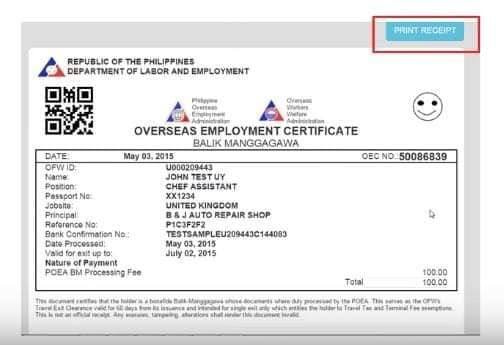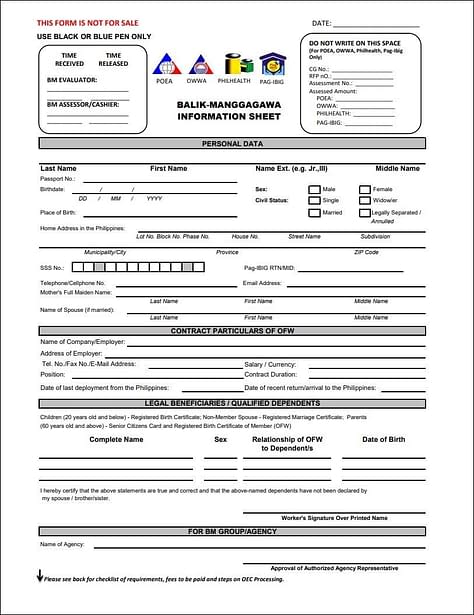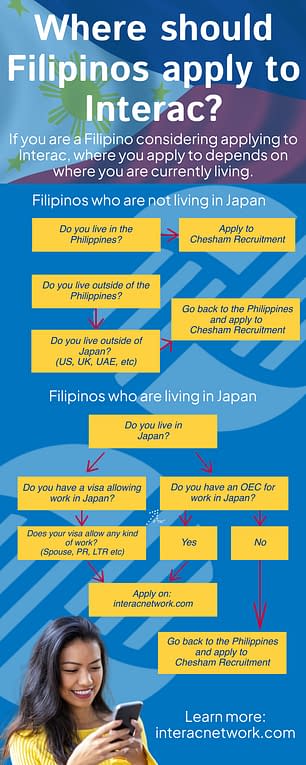- Japan Tips
A guide to working in Japan as an ALT for Filipinos

Introduction:
Filipinos looking to work abroad must meet requirements set by both the Philippine government for Overseas Filipino Workers (OFWs) and Japanese immigration. This double regulation is a burden applied to Filipino workers that is unlike any other nationality. This article will describe the system and give a path for Filipinos to follow when looking into teaching jobs as Assistant Language Teachers (ALTs) with Interac.
The management of OFWs is the domain of the Department of Migrant Workers (or DMW formally the POEA) who administers the issuance of OECs (Overseas Employment Certificates) for about 1.7 million Filipino workers abroad. Obtaining an OEC is a process that can only be completed in the Philippines. All OFWs must have an OEC when leaving the Philippines to go to a job abroad. For OFWs coming to Japan, this is an additional requirement on top of getting a working visa for Japan. Interac assists with obtaining a visa for Japan, but obtaining an OEC is the responsibility of the OFW. For Japan, the offices in charge of managing OFWs is are the MWOs (Migrant Worker’s Office.) in Tokyo and Osaka.
Filipinos living outside of the Philippines who live outside Japan are also subject to the rules of DMW and are required to have OECs to work abroad. An OFW can only go from a third country (US, UK, UAE, South Korea, Thailand, etc.) to Japan after first returning to the Philippines and obtaining a new OEC to work in Japan.

Application Process for Filipinos by country of residence
There are five cases of Filipinos who can apply to Interac to become ALTs, depending where they live.
For Filipinos living in the Philippines or a third country other than Japan:
Case 1: Living in the Philippines
If you are living in the Philippines, you should apply to our agent in Manila, Chesham Recruitment. https://cheshamrecruitment.com.ph/
Case 2: Living outside of the Philippines in a third country
If you are living in a third country like the US, UK, UAE, South Korea, etc., then you should return to the Philippines and apply through Chesham Recruitment. Please note Chesham is only able to work with applicants living in and applying from the Philippines. https://cheshamrecruitment.com.ph/
For Filipinos Living in Japan:
Case 3: Living in Japan with a status of residence allowing work at any job in Japan
If you are living in Japan and have a status of residence allowing you to work at any job, like a spouse visa, permanent residence, long-term resident, etc., then you can apply directly to interacnetwork.com without an OEC. This is because your main purpose for being in Japan is not to work and the MWO does not consider people under these visa statuses an OFW.
Case 4: Living in Japan with a status of residence allowing work in one job category and also having an OEC for a job in Japan.
If you are an OFW with a valid OEC for a job in Japan and have a status of residence allowing work at that one type of job, then you can apply directly to interacnetwork.com.
In this case, you’re likely working for the employer who recruited you from the Philippines, and your visa and OEC were arranged for that job. Therefore, Interac can assume you were recruited by your current company properly, and have been meeting all the requirements of being an OFW up to that point. If your visa type is not Instructor, Interac will give you the necessary paperwork to change your Japanese visa to Instructor.
Case 5: Living in Japan with a status of residence that restricts work, but not having an OEC for a job in Japan.
If you are living in Japan with a status of residence that restricts work, but do not have an OEC for a job in Japan, you will need to return to the Philippines and apply to Interac through Chesham Recruitment. https://cheshamrecruitment.com.ph/
Some common examples of this case are people who came to Japan to be a student, or to visit family in Japan, or to stay with a family member as a dependent. Others such as workers in a trainee program may be required to return to the Philippines as part of their status of residence category. In these cases, Interac is not able to work with these statuses of residence.
Conclusion
We’ve summarized the requirements for OFWs looking to work in Japan. The most important thing to remember is that there are double requirements: Japanese immigration requirements and the Philippine government requirements. Both must be completed to work as an ALT with Interac.
Interac consults closely with authorities in the Philippine government and requires one hundred percent compliance with both Philippine and Japanese laws and regulations. There are employers in Japan who do not follow these laws and regulations, and from our point of view, they do not respect Filipino workers and are not worthy of consideration from job seekers.
If you have any questions about the requirements for OFWs, please feel free to send us a message through our website. For more information about living and working in Japan as an Interac ALT, click here. To apply for ALT jobs, click here.

